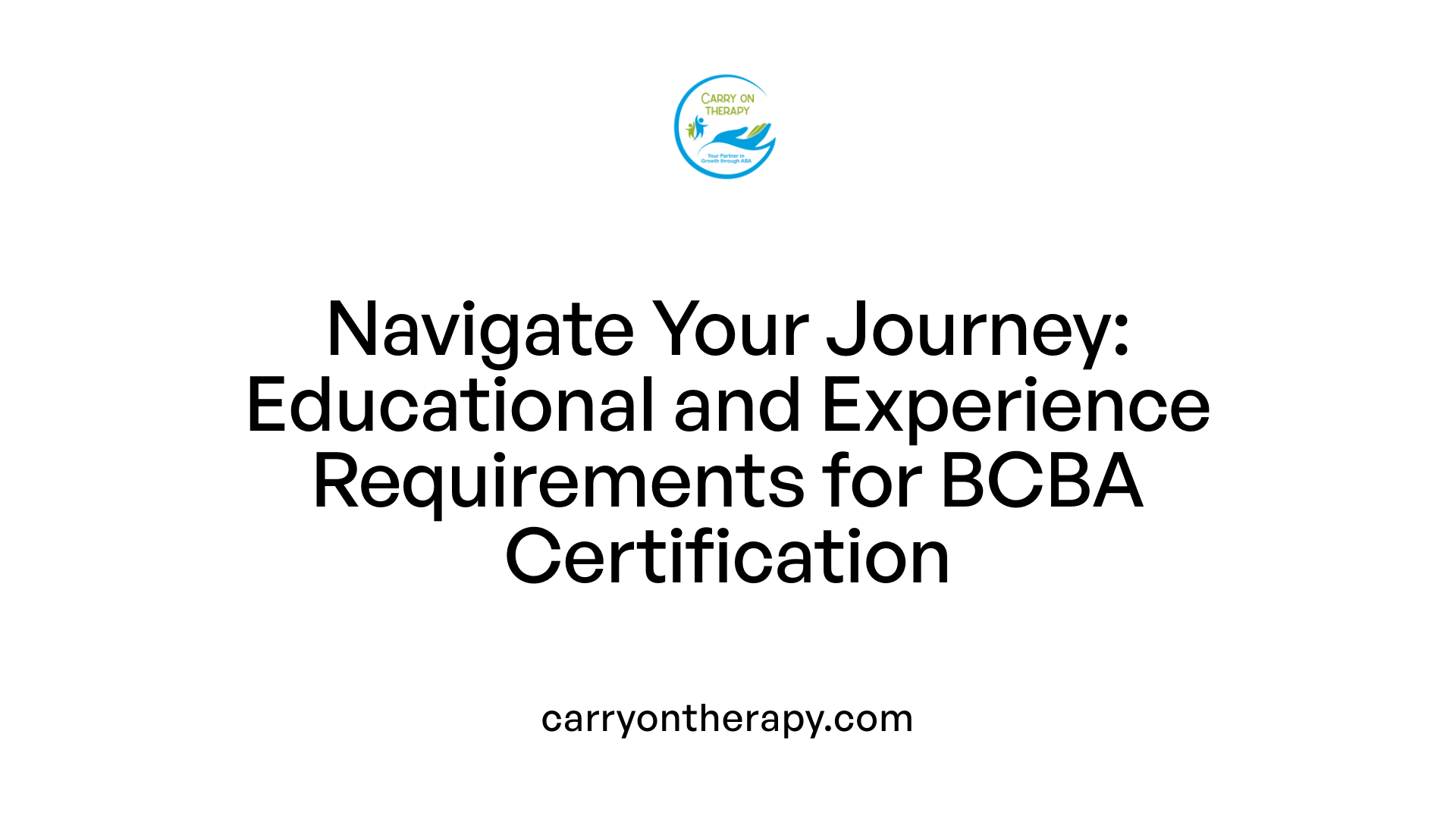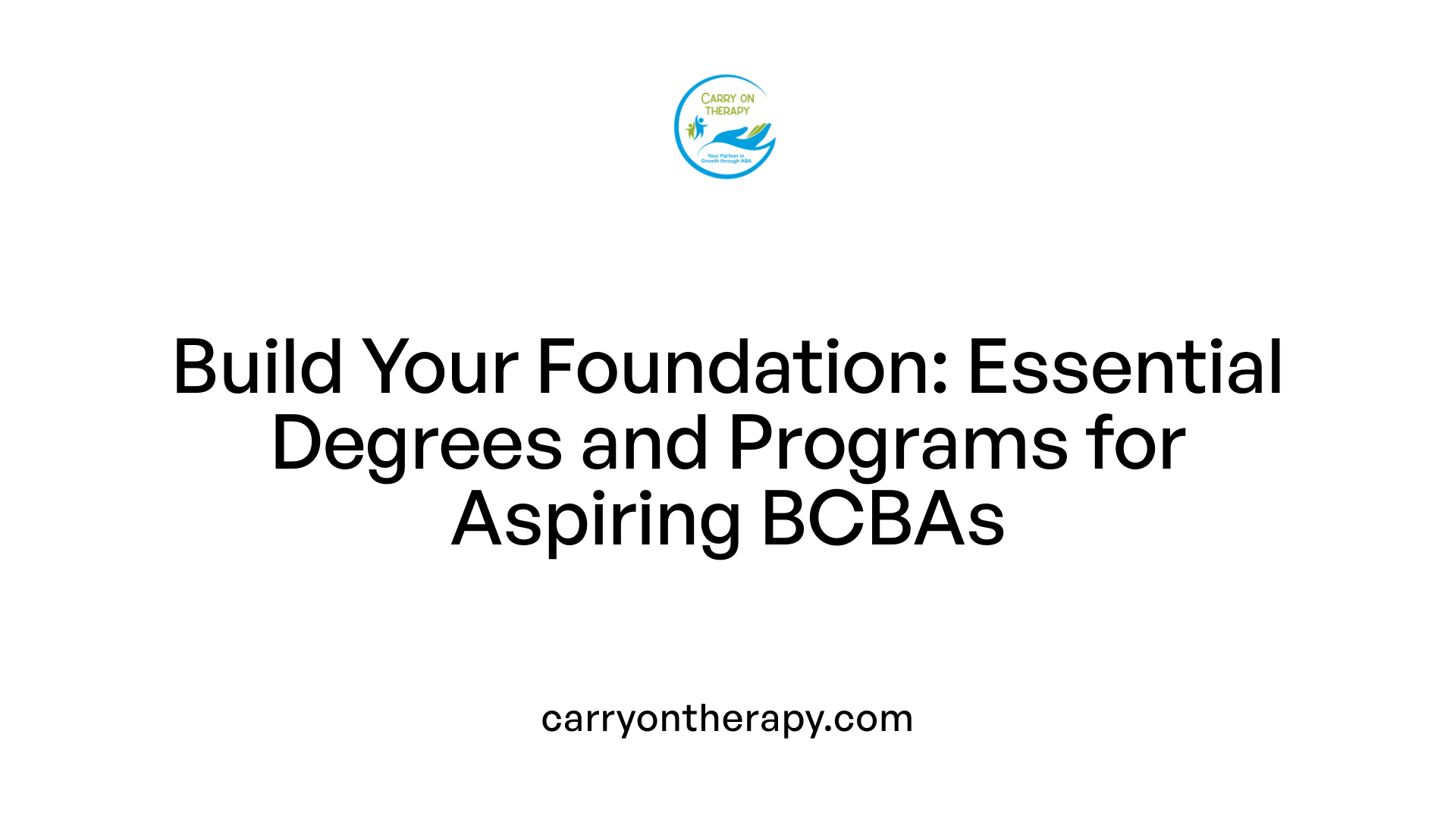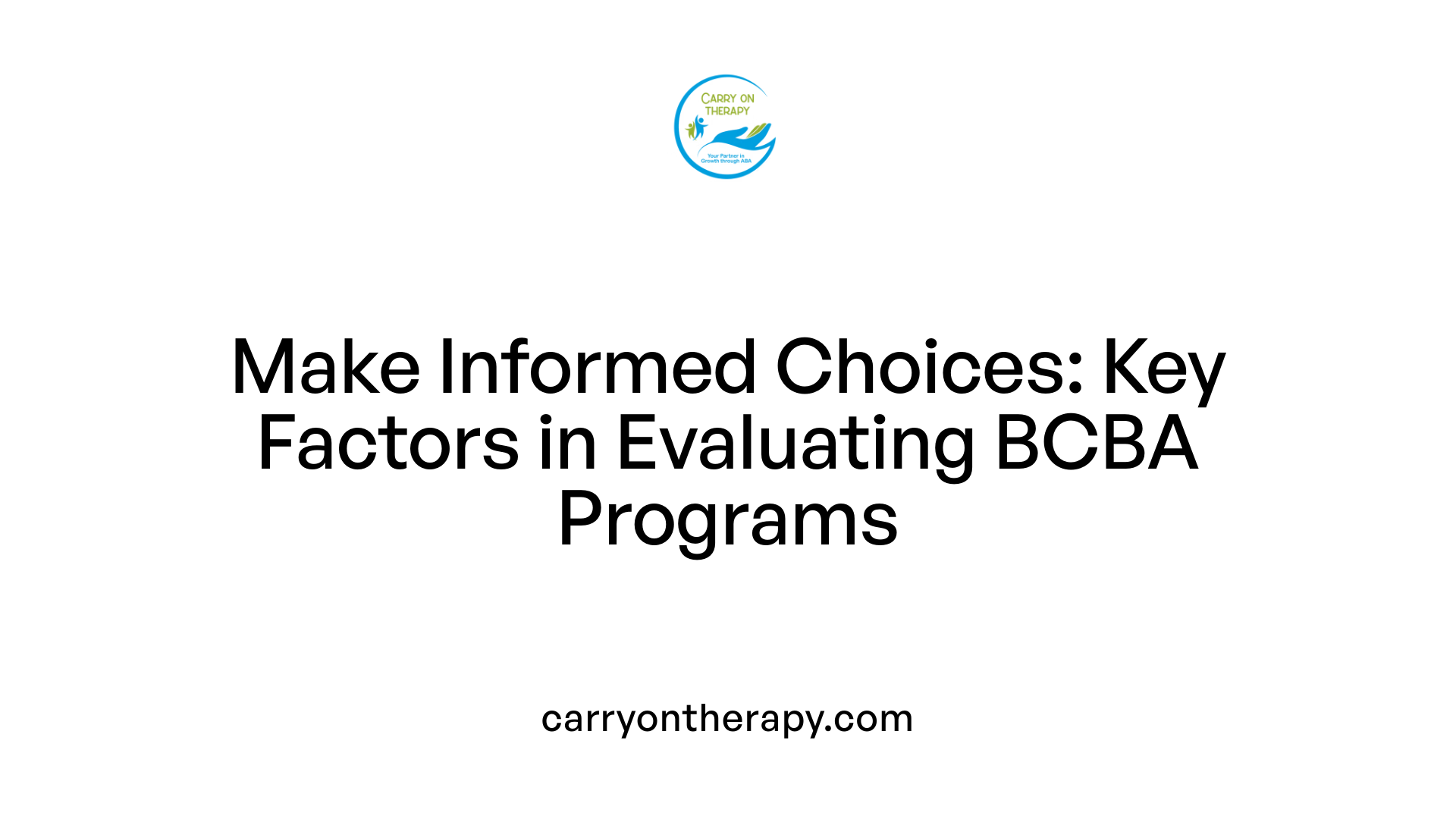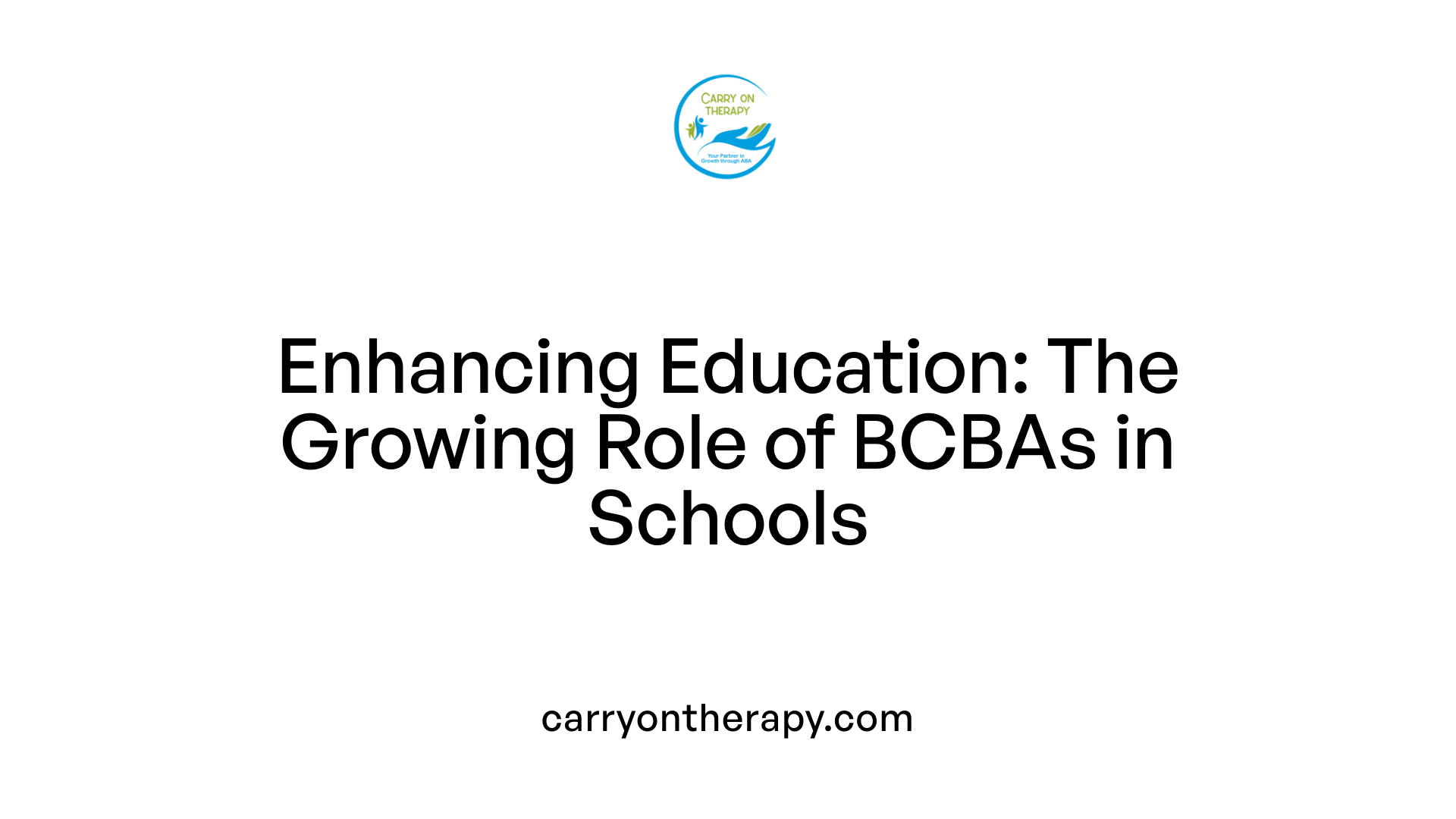BCBA Programs & Schools
Exploring Educational Pathways and Opportunities in BCBA Certification

Introduction to BCBA Certification
With the increasing demand for Board Certified Behavior Analysts (BCBA), understanding the educational pathways and program options available is crucial for prospective students. This article aims to provide a comprehensive guide on BCBA programs, exploring curriculum, accreditation, and potential career outcomes to assist individuals in making informed decisions about their careers in Applied Behavior Analysis (ABA).
Understanding the Path to BCBA Certification

How long does it take to become a BCBA?
To become a Board Certified Behavior Analyst (BCBA), the typical pathway spans about six to eight years. This time frame incorporates both undergraduate and graduate education, alongside practical experience requirements necessary for certification.
First, candidates usually complete a four-year bachelor's degree. While a degree in psychology or a closely related field is recommended, it's not mandatory. Next, aspiring BCBAs must progress to obtain a master’s degree in applied behavior analysis (ABA), which can take an additional two to three years.
Educational and Experience Requirements
In addition to the academic requirements, candidates need to accrue practical experience. This involves completing between 1,500 and 2,000 hours of supervised fieldwork. The exact number of hours is contingent upon the nature of the supervision received during this practical experience.
Candidates must also fulfill required coursework as part of an accredited program, which provides the essential foundation for successful practice in behavior analysis. Programs accredited by the Behavior Analyst Certification Board (BACB) ensure that students meet the necessary criteria for the exam and future practice.
Certification and Licensure
Upon satisfying the education and experience prerequisites, candidates can apply for BCBA certification. They must pass the BCBA exam, which consists of 160 questions and assesses various important topics in behavior analysis.
After passing the exam, certification is granted, enabling individuals to practice independently and supervise Registered Behavior Technicians (RBTs) and Board Certified Assistant Behavior Analysts (BCaBAs). It's worth noting that maintaining this certification requires ongoing continuing education, reflecting the commitment to staying current in the field.
Educational Degrees and Requirements for Aspiring BCBAs

Importance of Accredited Programs
Accredited programs play a crucial role in preparing candidates for the Board Certified Behavior Analyst (BCBA) certification. These programs meet the rigorous standards established by the Behavior Analyst Certification Board (BACB), ensuring that graduates receive a quality education in behavior analysis. Programs accredited by the Association of Behavior Analysis International (ABAI) not only fulfill the coursework requirements but also equip students with essential skills needed in the field.
Institutions like the University of North Carolina Wilmington and Utah State University boast a 100% pass rate on the BCBA exam for first-time candidates, showcasing the effectiveness of their accredited programs. Likewise, universities like Jacksonville State University and Vanderbilt University also demonstrate solid performance with impressive pass rates, reflecting their commitment to high educational standards.
Degrees Needed for BCBA Certification
To embark on the journey to becoming a BCBA, candidates typically start with a bachelor’s degree in a related field such as psychology, social work, or special education. Following this, they must pursue a master’s degree in Applied Behavior Analysis or a related area, ensuring it is a verified program recognized by the BACB.
The challenge continues with the need for rigorous coursework, focusing on behavior-analytic practices and principles, as well as preparing for the BCBA exam, which consists of 160 questions covering fundamental topics.
Supervised Fieldwork Requirements
Supervised experience is a cornerstone of BCBA training. Candidates must complete between 1,500 to 2,000 hours of supervised fieldwork, depending on their education track. For instance, some programs, like the USC Practicum track, require 1500 hours, ensuring that candidates apply their skills in real-world settings.
To summarize, aspiring BCBAs must follow a well-structured educational path:
This organized approach provides them with the expertise necessary to excel in the behavior analysis field.
Evaluating BCBA Programs: What to Consider

Accreditation
When searching for a BCBA program, checking for accreditation is essential. Programs accredited by the Association for Behavior Analysis International (ABAI) meet the degree and coursework requirements outlined by the Behavior Analyst Certification Board (BACB). These accredited programs ensure that students are receiving quality education designed to prepare them for BCBA certification.
Program Structure
The structure of the program plays a significant role in the learning experience. Prospective students should evaluate whether the program offers a hybrid format, allowing a mix of online and campus-based learning. Additionally, looking into the course completion timeline is crucial. For example, the M.Ed. program typically spans one and a half years, offering flexibility to accommodate working professionals.
Cost and Flexibility
Finally, consider the cost and delivery method of the program. Online BCBA programs can be more economical, making them an attractive option for many students. Institutions like Capella University offer fully online Master’s programs, which may appeal to those balancing work and education. On-campus options, such as the one at Florida Institute of Technology, provide robust networking opportunities and hands-on experience.
Considering these factors will lead you towards a program that aligns best with your professional goals.
Online vs. On-Campus BCBA Programs
Format Comparison
When considering Applied Behavior Analysis (ABA) education, prospective students often weigh the options between online and on-campus BCBA programs. Online programs offer flexibility, allowing students to study from home while managing work commitments. In contrast, on-campus programs provide a traditional classroom experience with direct faculty engagement and hands-on opportunities.
Advantages and Disadvantages
Online BCBA Programs
- Advantages:
- Flexibility in scheduling allows for study alongside professional responsibilities.
- Typically lower overall costs compared to on-campus alternatives.
- Disadvantages:
- Limited personal interaction with peers and faculty.
- Some programs may lack practical engagement opportunities.
On-Campus BCBA Programs
- Advantages:
- Enhanced student interaction, fostering networking and collaboration.
- Direct access to faculty for mentoring and support.
- Disadvantages:
- Less flexible scheduling may require students to adjust work commitments.
- Often higher costs due to commuting and campus facilities.
Cost Considerations
When choosing a BCBA program, the cost can vary significantly between online and on-campus options. Online programs may offer financial savings through lower tuition and reduced commuting expenses. However, it's important to assess the value of each program, including the quality of education and support services. Ultimately, the choice between online and on-campus programs should consider individual learning styles, flexibility needs, and career goals.
Career Prospects and Salary Expectations for BCBAs

Salary Ranges
While the average salary for a Board Certified Behavior Analyst (BCBA) in the United States is approximately $75,784, there is potential for significantly higher earnings in this field. Many BCBAs in supervisory or specialized roles can earn between $80,000 and $90,000.
Several factors can influence these salary figures, including:
- Geographic location
- Relevant work experience
- Specializations, such as early intervention
Career Opportunities
The demand for BCBAs is growing, opening doors to various career paths. These professionals can work in a range of settings, including:
- Schools (public and private)
- Private practices
- Hospitals and clinics
- Non-profit organizations
- Research institutions
Additionally, with credentials like BCBA-D, individuals can pursue advanced roles in academia or leadership positions within organizations.
Factors Influencing Earnings
Earnings as a BCBA can vary based on several factors, including:
- Location: Salaries differ significantly by region, with urban areas often offering higher compensation.
- Experience: More experienced BCBAs typically command higher salaries.
- Specialization: Focus areas such as autism spectrum disorder or behavioral health can lead to increased pay.
In conclusion, while entering the BCBA field ensures a stable salary, BCBAs with specialized expertise, experience, and a focus on continuous professional development can achieve a six-figure income and enjoy a rewarding career.
The Role of BCBAs in Educational Settings

Employment Opportunities in Schools
BCBAs, or Board Certified Behavior Analysts, are becoming increasingly essential in K-12 education. Schools are recognizing the importance of behavior analysis in supporting students with challenging behaviors and developmental disabilities. As a result, many districts are establishing BCBA positions to improve student outcomes.
Trends in Hiring BCBAs
The demand for BCBAs in educational settings is on the rise. Previously, schools relied on a consultative model for behavioral support, but now there is a notable shift. Districts are beginning to hire BCBAs directly, allowing them to assess, implement, and supervise behavior programs more effectively within the school environment.
Roles and Responsibilities
BCBAs are tasked with developing individualized behavior intervention plans, conducting functional behavior assessments, and training staff on behavior modification techniques. Their expertise is vital in creating supportive learning environments, ensuring all students can thrive.
Can you work in a school as a BCBA?
While schools in the past have focused on a consultative model when it comes to BCBAs, it has become a growing trend for schools to hire a district-wide BCBA of their own. This shift allows for more comprehensive support and proactive behavior management strategies to be implemented direct within the educational setting.
Pass Rates and Performance Indicators of BCBA Programs
Program Pass Rates
The pass rates of various BCBA programs are a crucial metric for prospective students. Several institutions stand out with impressive statistics:
Exam Preparation Support
Institutions often provide tailored support to prepare students for the BCBA exam. Programs typically incorporate:
- Comprehensive coursework meeting BACB standards.
- Supervised fieldwork opportunities crucial for hands-on experience.
- Study materials and group sessions to bolster exam readiness. The average exam consists of 160 questions referring to practice essentials, making robust preparation packages vital.
Reputation and Outcomes
Reputation can heavily influence job placement rates post-graduation. Key factors include:
- Accredited programs by ABAI ensuring rigorous educational standards.
- Faculty expertise guiding students toward effective practice.
- Historical job placement stats reflecting successful integration into the field.
Overall, a high pass rate coupled with positive outcomes paints a promising picture for students entering ABA careers.
Conclusion
Choosing the right BCBA program can significantly impact a candidate's success in certification and career. It is essential to evaluate aspects such as program accreditation, faculty expertise, curriculum rigor, and practical experience opportunities. With a growing need for qualified BCBAs, especially in educational and clinical settings, pursuing this career path offers both rewarding and lucrative opportunities.
References
- Top 30 ABA Programs in the US 2024 - Action Behavior Centers Blog
- Board Certified Behavior Analyst
- Accredited Programs
- Applied Behavior Analysis, M.Ed. and BCBA® Certification
- MS, Applied Behavior Analysis, Disability, & Diversity
- BCBA Programs & Schools - Grateful Care ABA
- How To Become a Board Certified Behavior Analyst
- Board Certified Behavior Analyst: Definition and Responsibilities







